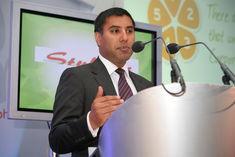
The push for corporate responsibility in the food industry has shifted from the government to the supermarkets, Sainsbury’s category manager Jat Sahota told the Re:fresh conference, before showcasing a number of initiatives led by the retailer.
The UK number-three supermarket, which sees 17 million consumers come through it doors each week, aims “to be the best for food and health”, Sahota said.
“We want to source with integrity, show respect for the environment, make a positive difference to the community and be a great place to work,” he added.
“But the stances that supermarkets take have to be robust - the problems are not simple.”
Sahota challenged the industry to “be bothered” and “make a difference”, adding that, as half of consumers are willing to pay five per cent more for ethical food, “they are commercial choices as well as ethical ones”.
“If we aren’t asking you to this now, we will soon or someone else will,” he insisted.
He held up a number of Sainsbury’s initiatives as models for corporate responsibility.
The projects included a study carried out by Cranfield University and World Flowers, which found that the carbon footprint of roses sourced from Kenya is six times lower than for product grown under glass in the Netherlands, to allow consumers to make a choice between air miles and “fair miles”, an environmental strategy in the form of Operation Bumblebee, and the development of a high-density Concept Orchard.
The retailer launched a pesticide reduction strategy last year and, according to Sahota, details of its pesticide monitoring will be published in its annual report.
Sainsbury’s will publish its list of banned and restricted chemicals on July 7.
“We want to create step change in growing and post harvest - our aim is to be 100 per cent residue free,” Sahota said. “There are a lot of chemicals that we want to see removed from our supply chain.”
Sainsbury’s most publicised move towards social responsbility - its switch to 100 per cent Fair Trade bananas - is on track to meet its July target, Sahota told delegates.
“This is the biggest single move on Fairtrade in the world, and there is still more work to be done,” he said.
But he added that the switch had already generated some £4 million in Fair Trade social premium this year, up from the £3m mark in 2006.



